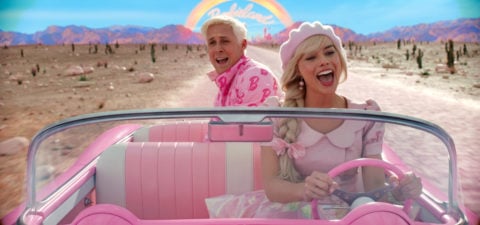Bemoaning how Hollywood treats its franchises these days is quite the cliche. So much so that it’s become a favorite pastime for movie geeks all over the world. It’s even more “basic” to spill ink about the nostalgia treadmill that no studio exec can resist jumping on with a glee usually reserved for kids in candy stores. Specifically, they seem to have an aversion towards moving forward and sowing new ideas on grounds fans deem oh-so sacred. And yet, here we are on the precipice of yet another vaunted horror franchise reaching into the past to chart its creative future.
Neve Campbell’s recent comments about Scream’s seventh installment compared it to Halloween’s 2018 recipe. The irony is David Gordon Green’s film owes a debt to Halloween H2O. To say nothing of Scream 4, which already riffed on the idea of an older Sidney Prescott facing off with not only another deranged teenager in a Ghostface mask but also her survivor’s guilt and complicated feelings about her hometown. Notice a theme?
Horror is overflowing with original ideas and stories; this isn’t about the genre. But there’s something to say about the fact legacy films can’t quit examining, well, their legacies. A longing for the “good old” days and fears of upsetting even moderately vocal fanbases created a cul-de-sac for franchise horror with no way out in sight.
‘Halloween’ (2018)
Before going any further, this isn’t some new creatively bankrupt phenomenon. The Texas Chain Saw Massacre and Halloween famously tried that whole evolution thing in the 1980s. While connoisseurs appreciate those deviations now, those wild swings didn’t generate the necessary box office or fan response at the time. The Halloween franchise felt the sting so hard that they ensured everyone knew the fourth installment featured Michael Myers. Halloween 4: The Return of Michael Myers was comfort food for those who found Halloween III: Season of the Witch a little hard to digest. But only to a point. While Halloween 4 looked like a series going back to basics for most of its runtime, it did something very different in its final minutes that telegraphed a unique direction going forward. And yet, that moment gets explained away and rendered moot by the time Halloween 5: The Revenge of Michael Myers arrives one year later.
The creative urge for something new constantly clashes with the business need for something that prints money. The dollars and cents worshipers at the top of the industry often believe that taking the most minor creative risks makes the most sense because it leads to more dollars.
That’s why Nancy and her dad couldn’t escape Elm St. Or why Michael rarely stopped chasing his relatives. Or even the improbability that the Brody’s couldn’t escape Great White Sharks even while vacationing in the Bahamas. As the calendar turned and fandoms grew more significant, the demand for that type of thing only got louder. To quote one of the great fictional philosophers of our imaginary time, Philip J. Fry, “Clever things make people feel stupid and unexpected things make them feel scared!” Futurama’s insight is a bit harsh, but there’s still some truth buried in the satire.

‘Scream’ (2022)
In some cases, shifting to tried and true formulas is somewhat understandable. While they’re tacit admissions that sometimes the best idea is the first one, they’re also, at times, necessary business decisions. John Carpenter never envisioned Halloween as more than one movie. The same goes for Wes Craven and A Nightmare on Elm Street. Dollars to donuts, that’s probably the same story for most films that morph into the two words familiar to most people reading this website: intellectual property. That distinction comes with responsibilities to shareholders and CEOs and, no pun intended, the lifeblood of some companies. Ghostface is no longer just a person in a Spirit Halloween robe and a cheap dime store mask; Scream’s chief killer is a brand.
What was once taboo is now a t-shirt at almost any department store. There are Ghostface Funko Pops, ceramic mugs, backpacks, and even a hockey jersey for the little ones. Let’s keep it real: Scream and other franchises of its ilk have more in common today with McDonald’s or Burger King than the original horror flicks studios produce. That’s not an inherently bad thing, but it is a thing; viewing these properties through that prism makes the math add up. That’s why Jamie Lee Curtis found herself at the center of not one, but two Halloween “reboots” twenty years apart from one another. The movies about the psycho wearing the William Shatner mask established their formula in ’78, so no matter what, they always revert to something from that time period. Even the proposed Halloween TV series is a “creative reset” returning to… ’78.
Staying trapped in the familiar is on the con side of the ledger when horror becomes more significant than just a simple movie. Easily discernible why? Sure. But can it also mean preaching to the same choir from one installment to the next? Also yeah.
Fede Alvarez embraced yesteryear with Alien: Romulus, but he believes he did so without alienating (pun very much intended) a new audience. “You never want an audience to go see a movie and furrow their brow thinking, ‘Who is this person?’ Why is half the cinema so excited about this man and I don’t know who he is?” said Alvarez in a recent interview. “It becomes an excess I’m not interested in.”

‘Alien: Romulus’
How one feels about the excesses of which he showed great interest in Romulus aside, his overall point rings true. Rooting franchises in their glory days means not making them relevant for today. Everyone involved becomes so focused on paying homage to the past or dealing with older characters that they don’t justify the present or chart a future. That’s precisely where Scream finds itself right now. There’s a lot to how the seventh entry arrived at this point. So much so that there isn’t enough ink to cover it all here. What matters now is the beloved series moving away from a story that attracted old fans and created new ones in favor of playing the hits. Given the circumstances, the creative team behind the next Scream didn’t simply break glass in case of emergency so much as they shattered it by throwing a 100 mph fastball in the form of the Sidney Prescott solution.
For several reasons, some that look incredibly cynical, Scream can’t escape the vicious cycle even though it charted new waters.
We had a new core cast. The Grim Reaper finally collected on Dewey Riley’s long-term debt. Sidney was out of the picture, and who knows how many more attempts on her life Gale Weathers could weather. Scream and Scream VI reflected on their legacy without bathing in it. The movies looked fresh through the eyes of new characters rather than being slavish to Generation X and Millennials. Scream 4’s original ending almost pulled off this same high-wire act in 2011 until it didn’t. Some people behind the scenes got cold feet in the 9th inning for whatever reason. Writer Kevin Williamson’s bold move went bye-bye in favor of the status quo. Almost 15 years later, the Scream franchise still suffers from chili digits. Sadly, it’s not the only one.
For a genre built on punk rock sensibilities, there’s far too much conformity and timidness at the top of the food chain. Cul-de-sacs keep us in comfortable places by design, but horror isn’t about comfort. It never was. The second these prominent properties remember that is the reason Target happily sells t-shirts to children with masked killers etched on the front, we might finally get off this road to nowhere.

‘Texas Chainsaw Massacre’ (2022)


























































![Mason Ramsey – Twang [Official Music Video] Mason Ramsey – Twang [Official Music Video]](https://i.ytimg.com/vi/xwe8F_AhLY0/maxresdefault.jpg)





















